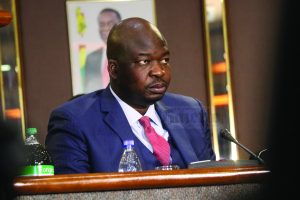

ZIMBABWE has an “internal audit system”, which was developed after recommendations from a March 2023 special committee made up of Finance ministry, Procurement Regulatory Authority of Zimbabwe, Public Service Commission and president’s office officials.
This comes as the Auditor General (AG)’s latest report has allegedly unearthed a number of cases where government has paid for undelivered goods and services, including cars, information technology and medical equipment, which statements have been described as “misplaced” by treasury secretary George Guvamatanga.

Finance ministry secretary George Guvamatanga
“We have a centralised internal audit unit, which was created about four years ago and with a view of improving governance issues across ministries, departments and agencies (MDA’s), enforce our three tier control system, provide accurate and up-to-date information by constantly reviewing data, and lessening reporting cycles,” he told the Financial Gazette yesterday, adding of the “vaunted 97 vehicles which were unaccounted for, only 20 were outstanding”.
“So, we not only have a much improved public funds management system and are dealing with a technical audit matter referred to as ‘known to management’ issues, but some of the issues flagged by the AG actually came from the committee’s push – through treasury – to institute a once-off audit, which then alerted several institutions of these outstanding supplies,” Guvamatanga said, adding this was part of Harare’s “value for money” policy which ultimately saw various suppliers blacklisted, and disbarred from participating in public tenders.
Under the new and three tier system, financial – and transactional – reviews were not only being done by internal and external auditors in conjunction with the Finance ministry, but the AG’s office was always copied in all communications to do with the formation of the committee, the ex-Barclays Bank managing director said.
And in his swift response, Guvamatanga said he “was not trying to gag his government colleagues and prevent them from highlighting these issues”, but ensure that “there was a proper context to the debate”. Some misconceptions, he said, would have “been cleared up if state auditors had gone back to ministries to check on the latest state of accounts, asset books and acknowledge cured deficiencies or simply query outstanding matters”.
“On the car issue, for example, we knew as a ministry who had outstanding issues and, hence, we even wrote to MDA’s… to collect what is due to them,” he said, adding “we will continue to track and support the internal audit structure as well as AG’s work”.
Crucially, government audits must happen throughout the year reports being issued timeously, Guvamatanga said.
Sorry. No data so far.

